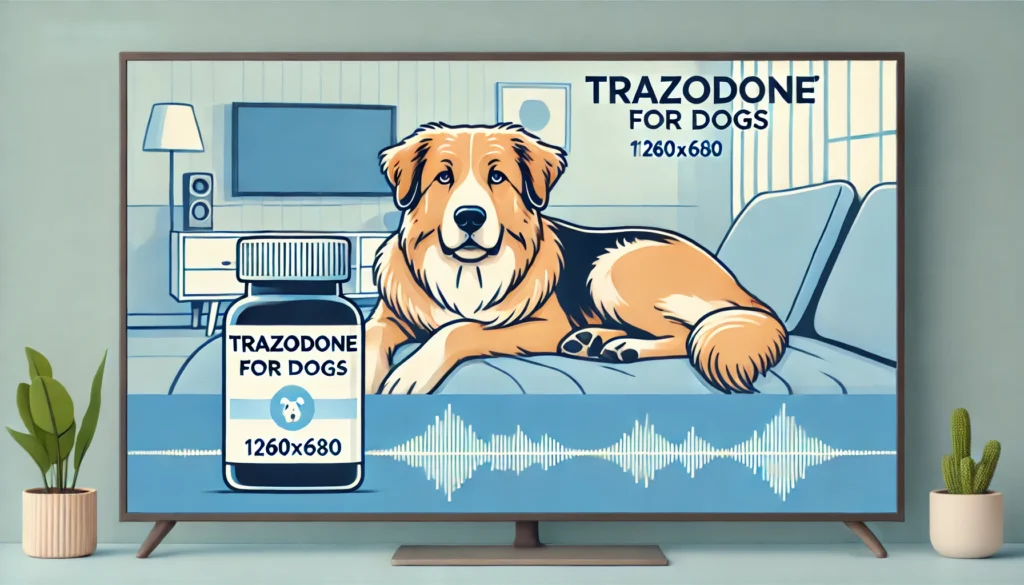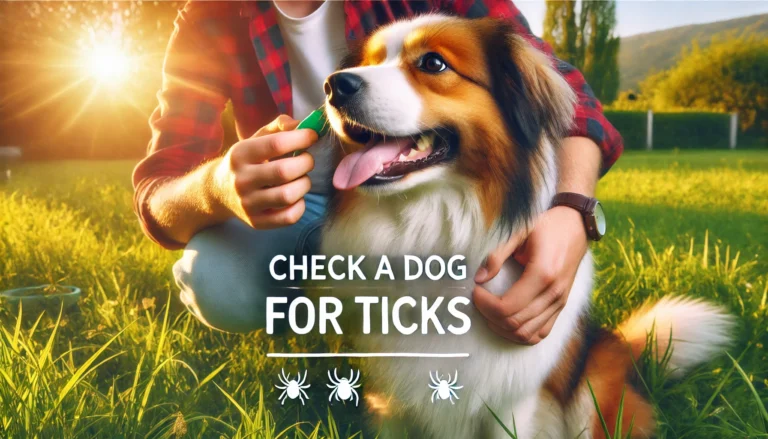Trazodone for Dogs | Dog, Pet Medication

An In-Depth Guide to This Pet Medication
Trazodone for Dogs, When it comes to managing anxiety and behavioral issues in dogs, veterinarians often turn to medications that are originally developed for humans. One such medication is Trazodone, a drug primarily used to treat depression in people but has found significant use in veterinary medicine, particularly for managing anxiety-related and behavioral conditions in dogs. This comprehensive guide will delve into what Trazodone is, how it works, its uses, dosage, side effects, and much more.
What is Trazodone?
Trazodone is a prescription antidepressant belonging to the class of drugs known as serotonin antagonist and reuptake inhibitors (SARIs). It primarily affects neurotransmitters in the brain, altering the chemical balance to help stabilize mood and anxiety levels. Although initially developed for human use, it has been effectively used in veterinary medicine due to its sedative and anti-anxiety properties.
How Trazodone for Dogs works
The mechanism of action of Trazodone involves the inhibition of serotonin reuptake and the blockade of certain serotonin receptors (specifically 5-HT2A and 5-HT2C receptors). By preventing the reuptake of serotonin, Trazodone increases the level of serotonin in the brain, which helps to improve mood and decrease anxiety and aggression.
do you know
Dog Intestinal Blockage, When our furry friends start to explore the world, their curiosity doesn’t always know bounds. Often, this leads to some unwanted eating habits that can result in an intestinal blockage—a condition as serious as it sounds. From the small intestine blockage to symptoms of bowel obstruction, understanding these signs and knowing how to respond could save your dog’s life.
Uses of Trazodone for Dogs in Veterinary Medicine
Trazodone for Dogs is most commonly prescribed for dogs to manage various behavioral conditions. Here are some of the key uses:
1. Anxiety Management
Trazodone is effective in treating anxiety-related issues in dogs, such as separation anxiety, generalized anxiety disorder, and anxiety-related aggression. It helps calm the dog and makes them more manageable, especially in stressful situations like vet visits or when there are loud noises like fireworks.
2. Post-Surgical Care
Veterinarians often prescribe Trazodone to help dogs recover from surgery. Its sedative properties help keep dogs calm and still, which is crucial for a successful recovery, especially after orthopedic surgeries where movement can compromise healing.
3. Combination Therapy
In some cases, Trazodone for Dogs is used in combination with other behavioral medications or therapies to treat more complex behavioral issues. It can be combined safely with other drugs, such as SSRIs (selective serotonin reuptake inhibitors) or benzodiazepines, under veterinary supervision.
4. Behavioral Modifications
Trazodone for Dogs can also be used as part of a behavioral modification program, often in conjunction with training and environmental changes, to help manage undesirable behaviors in dogs.
Dosage and Administration
The dosage of Trazodone for Dogs can vary widely based on the dog’s weight, the condition being treated, and the individual dog’s response to the medication. It is crucial that Trazodone is prescribed by a veterinarian who can tailor the dosage to the dog’s specific needs.
General Guidelines Trazodone for Dogs
- Typical Dosage: The typical dosage ranges from 2.5 mg per kilogram to 15 mg per kilogram of a dog’s body weight.
- Administration: Trazodone is available in tablet form and can be given with or without food. However, administering the drug with food can help reduce gastrointestinal side effects.

Side Effects of Trazodone for Dogs
While Trazodone for Dogs is generally safe for dogs when prescribed by a veterinarian, there are potential side effects that pet owners should be aware of:
1. Gastrointestinal Issues
Dogs may experience vomiting, diarrhea, or decreased appetite when taking Trazodone.
2. Sedation
Excessive sedation is one of the most common side effects, although this is also a desired effect in many cases to keep the dog calm.
3. Hyperactivity or Agitation
In some cases, instead of causing sedation, Trazodone can cause hyperactivity or agitation in dogs.
4. Cardiac Effects
Although rare, Trazodone can affect the heart, leading to arrhythmias or other cardiac issues.
Interactions With Other Medications
Trazodone can interact with various medications, which can either diminish its effectiveness or increase the risk of side effects. Some of the common interactions include:
- MAOIs (Monoamine Oxidase Inhibitors)
- Other Antidepressants
- Certain Pain Medications
Precautions and Considerations
1. Health History
It’s important to provide the veterinarian with a full health history of your dog, especially of liver or kidney disease, heart disease, or other conditions that could affect the metabolism or excretion of the drug.
2. Monitoring
Regular monitoring is essential when a dog is on Trazodone, especially if it is being used long-term or with other medications. This might include blood tests to monitor liver and kidney function and check-ups to assess the dog’s response to treatment.
3. Behavioral Monitoring
Along with physical health monitoring, observing and recording changes in behavior are crucial to adjusting dosage or discontinuing if necessary.
Conclusion
Trazodone can be an effective medication for managing anxiety, post-surgery care, and behavioral issues in dogs when used under the guidance of a veterinarian. As with any medication, there are risks involved, but with proper management and monitoring, Trazodone can help improve the quality of life for dogs suffering from various conditions. Always consult with a veterinarian to ensure the safety and health of your pet.
What does trazodone do to a dog?
Trazodone acts on a dog’s central nervous system by increasing the level of serotonin in the brain, which helps to stabilize mood and reduce anxiety. It is often prescribed for its sedative and anti-anxiety effects, making it useful for treating conditions such as separation anxiety, phobias, and other stress-related behaviors. By blocking certain serotonin receptors and preventing the reuptake of serotonin, trazodone promotes calmness and can help manage behavioral issues in dogs without causing significant sedation when dosed properly.
How long will Trazodone for Dogs make them sleep?
The sedative effects of trazodone can vary depending on the dosage and the individual dog, but generally, it can cause drowsiness that lasts between 4 to 8 hours. It’s not specifically used to induce sleep, but its calming effect can help a dog rest more comfortably, especially in stressful situations or post-surgery. The full effect of the medication is usually observed within one to two hours of administration.
Can trazodone cause constipation in dogs?
Yes, trazodone can cause gastrointestinal issues in dogs, including constipation. This side effect isn’t the most common, but it’s possible, especially when trazodone is used in higher doses or for prolonged periods. Other potential gastrointestinal side effects include diarrhea and vomiting. If constipation or other digestive disturbances occur, it’s important to consult a veterinarian to adjust the dosage or explore alternative treatments.
What is the biggest side effect of Trazodone for Dogs?
The biggest side effect of trazodone in dogs tends to be sedation. This can range from mild drowsiness to profound sedation, depending on the dose and the individual dog’s reaction to the medication. While sedation is sometimes a desired effect for managing anxiety and promoting calmness, it can become problematic if it affects the dog’s quality of life or is more intense than intended.
Is Trazodone for Dogs safe?
Trazodone is considered safe for most dogs when prescribed by a veterinarian and used according to the recommended guidelines. However, like all medications, it can have side effects and is not suitable for every dog. It should be used with caution in dogs with certain health conditions such as kidney disease, liver disease, or heart disease. Regular monitoring and follow-up with a vet are crucial to ensure the safety and efficacy of the treatment.
What cannot be mixed with Trazodone for Dogs?
Trazodone should not be mixed with MAO inhibitors, as this combination can lead to serious drug interactions, including serotonin syndrome, which is potentially life-threatening. Care should also be taken when using it with other CNS depressants like benzodiazepines or certain pain medications, as these can increase sedation. Always inform your veterinarian about any other medications your dog is taking to avoid harmful interactions.
Should I give my dog trazodone in the morning or night?
The timing of administering trazodone depends on the specific needs and conditions being treated. For dogs with anxiety related to specific events (like thunderstorms or travel), trazodone is usually given before the triggering event. For general anxiety or overnight sedation, it might be more appropriate to administer it in the evening. Your veterinarian will provide guidance based on your dog’s specific situation.
Can dogs overdose on trazodone?
Yes, dogs can overdose on trazodone, and such instances can be serious. Symptoms of an overdose might include severe lethargy, vomiting, dilated pupils, tremors, or respiratory depression. If you suspect your dog has ingested too much trazodone, it’s crucial to seek veterinary care immediately to manage the overdose effectively and minimize the risk of serious complications.
What foods should you avoid while taking Trazodone for Dogs?
When your dog is taking trazodone, there aren’t specific foods that you need to avoid giving them, as the medication is not known to interact significantly with certain foods. However, it’s important to maintain a normal, healthy diet and avoid overfeeding or underfeeding, which can affect the overall health and how medications are metabolized.
Can Trazodone for Dogs make them not hungry?
Trazodone can sometimes cause a decrease in appetite as a side effect. While not all dogs will experience this, it’s something to monitor. If you notice a significant decrease in your dog’s appetite that persists, consult with your veterinarian. They may adjust the dose or suggest other ways to manage this side effect.
What is a natural alternative to Trazodone for Dogs?
For owners looking for natural alternatives to trazodone for managing anxiety in dogs, options such as CBD oil, herbal supplements like valerian root or chamomile, and pheromone diffusers might be considered. Additionally, behavior modification techniques and environmental enrichment can also play significant roles in managing anxiety naturally. Always discuss these options with your veterinarian to choose safely and effectively.
Does trazodone cause dogs to pee?
Trazodone does not typically cause increased urination in dogs. If you notice changes in your dog’s urination patterns while they are taking trazodone, it is more likely to be related to other factors. Consult with your veterinarian to rule out any underlying issues or side effects associated with the medication or other health problems.
Is Trazodone for Dogs safe?
Trazodone is generally safe for dogs when prescribed by a veterinarian and used as directed. It is effective in treating various behavioral issues and conditions associated with anxiety and stress. However, it is not suitable for all dogs, especially those with certain health conditions. Close monitoring for any adverse reactions or side effects is important to ensure its safety in use.
What organ does Trazodone for Dogs affect?
Trazodone primarily affects the brain and central nervous system by altering the levels of neurotransmitters, particularly serotonin, which helps regulate mood and behavior. It does not directly affect the organs like the liver or kidneys, but these organs are involved in metabolizing and excreting the medication, so their function is important in the safe use of trazodone.
What are the advantages and disadvantages of trazodone?
The main advantage of trazodone is its efficacy in treating anxiety, depression, and certain behavioral issues in dogs, with relatively mild side effects. It can be used safely in combination with other medications and is useful for short-term and long-term management. Disadvantages include the potential for sedation, which can be excessive in some cases, and other side effects like gastrointestinal upset or, rarely, cardiac issues. It also requires careful dosing and monitoring by a veterinarian.






